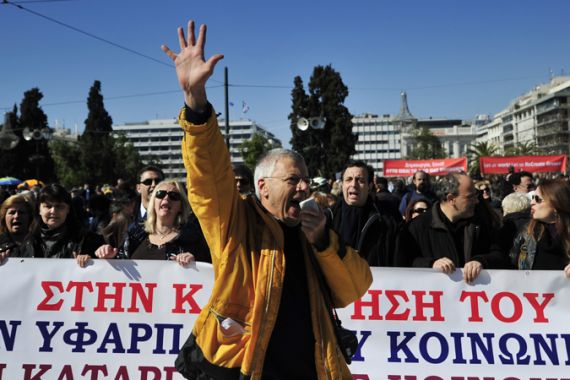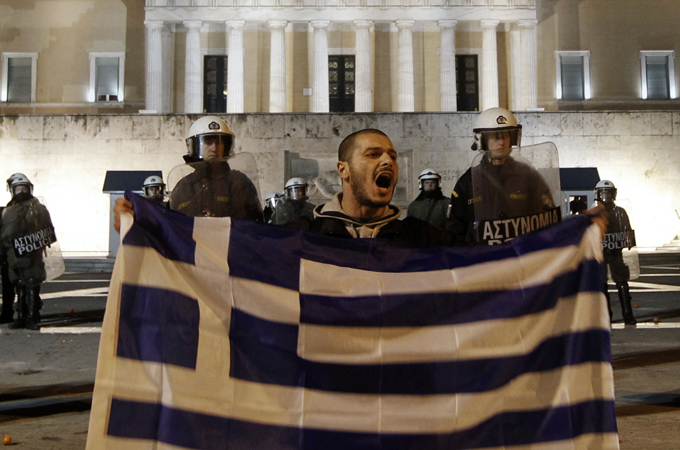Greeks rally against austerity steps
Deep budget cuts have paved the way for approval of a new $171 billion European bailout for the debt-laden nation.

 |
| The austerity measures include a 22 per cent cut to the minimum wage [REUTERS] |
Hundreds of banner-waving protesters have rallied in Athens to protest deep budget cuts that have paved the way for approval of a new $171 billion European bailout for the debt-laden nation.
Hundreds of police were out for the Sunday demonstration, held a week after parliament passed new austerity measures and sparked violent protests that saw protesters burn dozens of buildings in the Greek capital.
Eurozone finance ministers will probably approve a bailout package on Monday, though final details are still being worked out, Austrian Finance Minister Maria Fekter said on Sunday.
“Poverty and Hunger Have No Nationality,” read one banner carried by demonstrators on Syntagma square outside parliament.
“We Are Greeks, Merkel and Sarkozy Are Freaks” said another, referring to the German and French leaders.
Police said that roughly 1,500 protesters had assembled.
The latest budget cuts include a 22 per cent cut in the minimum wage, while pensions of more than $1,700 per month will be slashed by 12 per cent, further adding to the economic hardship of ordinary Greeks.
Greece was forced to make the new cuts after euro zone finance ministers earlier this month rejected the country’s proposal as not going far enough. But now they are apparently ready to go ahead.
“I don’t think there is a majority to go a different way because a different way is enormously arduous and costs lots and lots of money,” Fekter said in a television interview.
Greece’s private and public sector unions joined forces to call Sunday’s protest, rejecting what they brand “unacceptable demands” set by the European Union and the International Monetary Fund, saying they violate workers’ rights and collective agreements.
Radical leftist parties are also due to stage a second protest in Athens on Sunday afternoon.
“We are ashamed of our politicians, aren’t you?” said a banner in orange, the colour of a new party calling itself Creation Again.
“The measures are the worst thing that could have happened. It is outrageous. All the people are suffering. Shortly we will be asking ourselves where the bread is?” said pensioner Christos Artemis.
‘Scapegoats’
EU Justice Commissioner Viviane Reding said in an interview that Greece should stop looking for scapegoats abroad for its problems and work harder to get itself out of its economic mess.
“I wish the Greeks would concentrate on rebuilding their state rather than blaming scapegoats outside Greece for their plight,” Reding, who is also vice-president of the European commission, said in an interview with the Austrian daily Kurier.
The latest Greek cuts are aimed at reviving the nation’s moribund economy, which is battling a $461 billion debt mountain, by making businesses more attractive to investors and reducing the size of the parallel economy.
Fekter, the Austrian finance minister, said a key condition still being discussed is who will oversee Greece’s compliance with the bailout. The “troika” of the European Commission, European Central Bank and International Monetary Fund currently do, but Fekter said that could change.
If Greece does not receive the bailout, it will almost assuredly leave the single-currency eurozone, but Fekter said Europe was trying to avoid that.
“The euro finance ministers and, I believe, the heads of government agree that we will not leave Greece in the lurch in the euro zone and also won’t throw it out,” she said.
The new austerity measures, approved on Saturday, made up a $461 million euro shortfall in the package. A senior official told AFP in Brussels last week however that a 5.5 billion euro hole remains.
Greece already received a $145 billion rescue in May 2010.
Time is of the essence for the coalition government led by Prime Minister Lucas Papademos because without the bailout Greece will be unable to meet a bond repayment of $19 billion on March 20.
EU partners see Greece as the victim of chronic financial mismanagement by dynastic political forces, what Italian Prime Minister Mario Monti last week called a “perfect catalogue” of errors.
The new bailout has been likened to the aid equivalent of a hospital drip, with a small army of EU officials heading to Athens to make sure Greece delivers on its austerity pledges.
The Italian government said Friday after telephone talks that German Chancellor Angela Merkel, Monti and Papademos were “confident that a deal can be reached on Greece at the Eurogroup”.